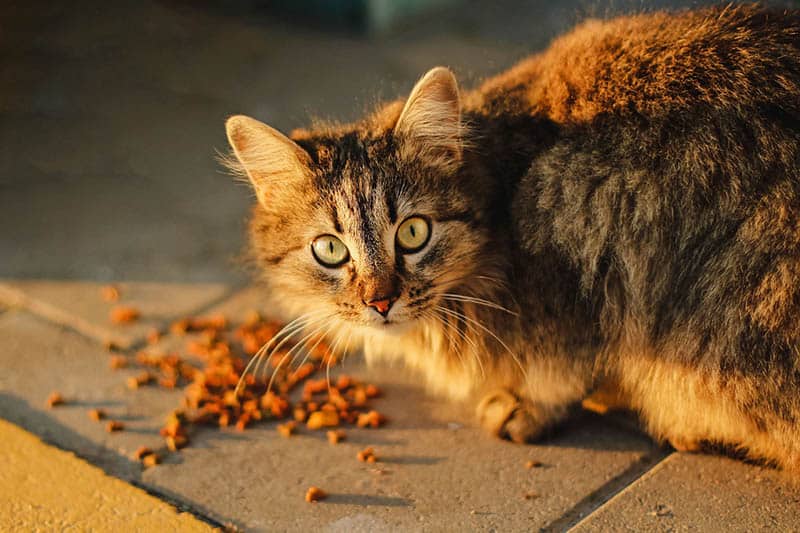Scientists can only estimate the number of feral cats in the United States, although data suggest it’s around 30 million animals, with many living in urban areas.1 It may sound odd to refer to these wild groups of felines as colonies given their propensity to be solitary animals. However, these cats will socialize, not unlike lions in prides. The most important factor regarding this behavior is the abundance of food. Without it, cats will form territories that they will mark and defend.
Therefore, choosing to feed a colony of feral cats is a commitment. The felines will learn to depend on the provisions you provide, not unlike birds at a feeder. After all, that’s one reason scientists theorize that wild cats became domesticated in the first place, when rodents drawn to grain stores lured the cats in to act as pest control when agriculture took off around 12,000 years ago. However, if you’re going to feed these animals, what exactly should you be offering? And how much is enough?
Before You Start
The role of feeding feral cats is controversial. You must understand the risks before you start. Consider the facts, like how according to the American Bird Conservancy (ABC), domestic cats have influenced the extinctions of 40 birds, 21 mammals, and 2 reptile species.2 It’s an international problem, prompting the Polish Academy of Sciences (PASIFIC) to classify them as an “invasive alien species.”3
Conversely, domestic cats excel as mousers. Rodents spread many serious diseases that are threats to wildlife and humans alike. Hunting provides invaluable mental stimulation and enrichment for these animals despite their harmful effects. We recommend carefully considering your role in this scenario. Research has shown that a high-protein diet may reduce predation, so maybe your actions could benefit wildlife.4 Really, there’s a lot to consider.
- Food bowls
- Commercial cat diet
- Measuring cup
- Shelter supplies
We strongly urge you to contact your city hall to ensure you’re not in violation of any local ordinances by feeding feral cats before you start.
The 12 Things to Know About Feeding Feral Cats
1. Observe the Cats in Your Area
Understanding the scope of your project is essential before you begin, particularly if there is an existing colony of cats in your neighborhood. Your goal is to get an estimate of the animals you’ll feed so that you can figure out your costs. Remember that the chances are high that many of them won’t be neutered or spayed, so plan on kittens joining the colony.
Research has shown that feral cats produce 2.8 offspring per animal.2 Of course, mortality is high with unowned felines, with projections of upward of 50% or more. We’ll return to this point later in this article.
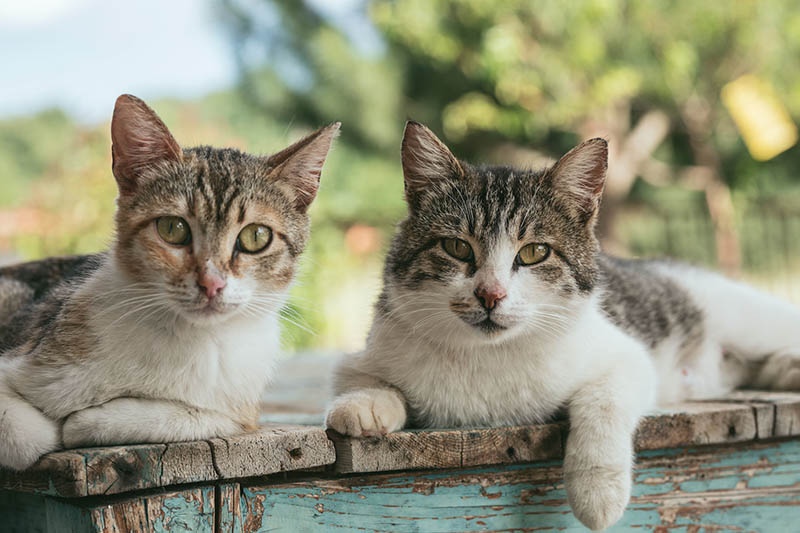
2. Consider the Pros and Cons of Canned and Dry Food
Strays likely have had experience with kibble and may readily eat it. It may be problematic for feral animals that have never been socialized, however. While canned food may be more palatable, dry diets are more practical and convenient. There’s also less risk of spoilage. Cost and storage are other valid considerations. However, the advantages of kibble tend to outweigh wet food, in this scenario.
3. Calculate the Cost of Food and Supplies
With your best estimate in mind, you can begin calculating your costs. We suggest looking for a commercial diet labeled for adults, because of the varying ages of the cats. You should also plan on utilizing several feeding stations to curb food aggression. The product’s packaging will indicate how much kibble to feed a single cat, so you can calculate how much food to feed the colony from there.
There’ll likely be some waste in the beginning until the cats get used to the routine. You can also train the animals to follow a feeding schedule to minimize food loss.

4. Choose a Feeding Location
The ideal place for a feeding location is away from foot traffic and other distractions. Remember that feral cats are on high alert without the benefit of socialization. It’s always a matter of survival with them. Animals are vulnerable when they have their heads down while eating, so you should also choose places that offer some protection from the elements. It’ll also help keep the food fresh.
5. Choose Your Feeding Supplies
Leaving food out goes against the advice for preventing pest infestations. Therefore, we suggest choosing ant-proof bowls to keep the bugs away. You can also sprinkle food-grade diatomaceous earth around the feed stations to avoid attracting them. Remember to replenish it after precipitation to maintain the barrier.

6. Provide Shelter
Animals need three things to survive: food, water, and shelter. You can easily provide water with another bowl at each feeding station. However, remember that means ensuring it’s filled and that the bowls are clean. Winter and freezing temperatures are other considerations on this front. You should provide the cats a shelter for inclement weather. Old cat carriers or rabbit hutches lined with hay can do the trick.
Felines are naturally drawn to boxes, so it doesn’t have to be anything elaborate. Even a lean-to may suffice.
7. Plan a Feeding Schedule
A feeding schedule is a critical part of your plan. Choose a time that works for you. Ideally, you should feed the colony daily. We also recommend picking up the food after a while to avoid attracting pests. Have a set time for cleaning the feeding stations and shelters as necessary. Felines are intelligent animals, so if you do your part, they’ll follow the routine. Cats dislike change, so a routine lets them know what to expect.
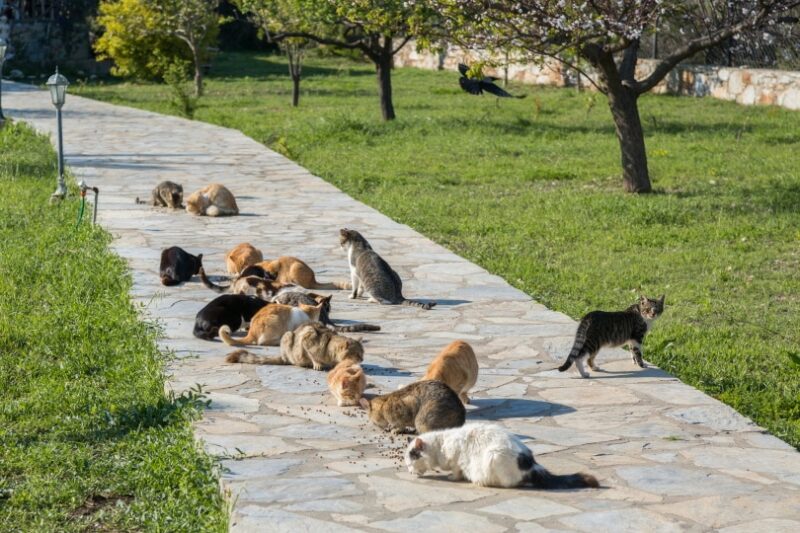
8. Be Consistent
It’s imperative to be consistent with your routine. It will help build trust between you and the colony. Cats don’t like change in the best of times, let alone when they’re living in the wild while always on edge. Ensure someone can fill in for you if you can’t do the job.
9. Plan for the Weather Extremes
We mentioned the lean-to shelter for protecting the animals from the elements, but you should also have a plan for other extremes, such as freezing temperatures. If you give the cats water, consider setting up a heater like the one used for bird baths or livestock. That will ensure the animals’ needs are met even if the weather isn’t cooperating.
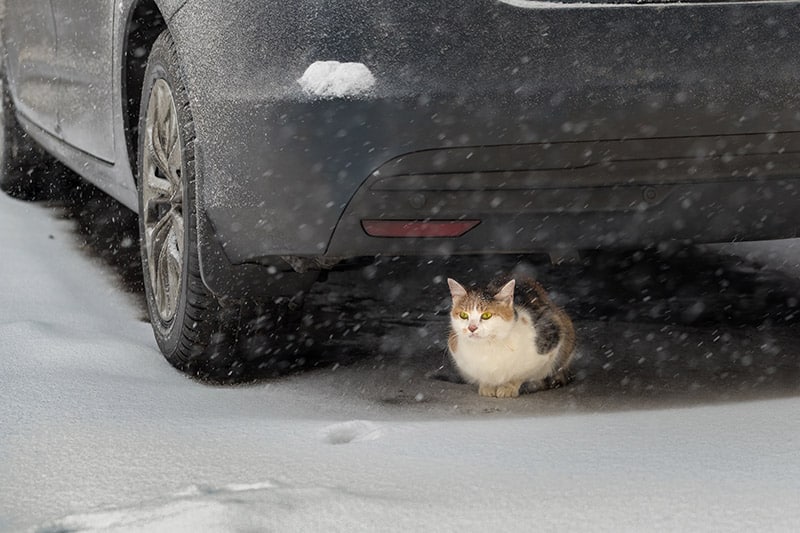
10. Keep the Human Community in Mind
It’s worth mentioning that not everyone will like the idea of a colony of feral cats hanging around the neighborhood. That’s where you need to step up and do your part. Picking up the food to avoid attracting rodents, insects, and birds is an excellent start. You should also clean up after the animals if they do any damage. But usually, the cats will get their fill and then wander off for the day.
11. Consider Your Other Responsibilities
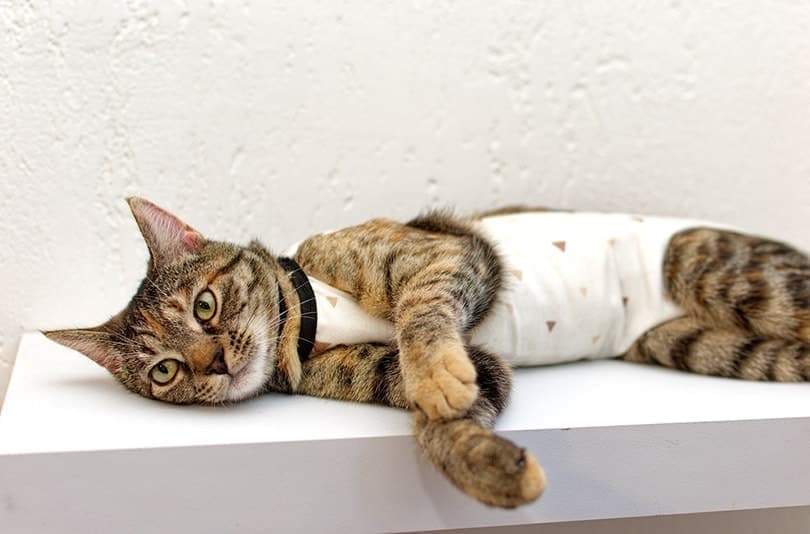
We mentioned the issue of feral cats having kittens earlier. Another thing to consider is whether you want to take your contribution one step further by participating in a trap-neuter-return (TNR) program. You can ask your local animal shelter, university, or vet clinic for more information. Essentially, it works just like it sounds. A feral cat is trapped, neutered, and then released so that they don’t contribute to the growing feral cat population. The best scenario for any cat is a forever home, but it isn’t always possible with all animals.
However, practicing TNR can make things go better in your neighborhood if someone objects. Also, getting the cats vaccinated against rabies can further smooth any ruffled feathers.
12. Maintain Your Site
Ongoing environmental maintenance is critical for the cats’ health and your responsibility as a good neighbor. When the cats aren’t around, thoroughly clean the site and replace any bedding you may have put out. It’s also a good time to look for any obvious signs of internal parasites. Feral cats often need deworming to keep the parasite load under control, and you’ll sometimes notice worm fragments in their feces. Keeping things clean is better not only for the neighborhood but for the colony as a whole.
Final Thoughts
Feeding a colony of feral cats is a responsibility that you shouldn’t take lightly. It’s a financial and time commitment to the animals and your neighbors. It may also carry legal obligations. However, you may find that the wild felines will come to accept you as their caregiver with time. They may fill this void if you can’t have pets at home, as the rewards of helping animals in need can be priceless.
Featured Image Credit: Anna Kumpan, Unsplash
Contents
- Before You Start
- The 12 Things to Know About Feeding Feral Cats
- 1. Observe the Cats in Your Area
- 2. Consider the Pros and Cons of Canned and Dry Food
- 3. Calculate the Cost of Food and Supplies
- 4. Choose a Feeding Location
- 5. Choose Your Feeding Supplies
- 6. Provide Shelter
- 7. Plan a Feeding Schedule
- 8. Be Consistent
- 9. Plan for the Weather Extremes
- 10. Keep the Human Community in Mind
- 11. Consider Your Other Responsibilities
- 12. Maintain Your Site
- Final Thoughts

